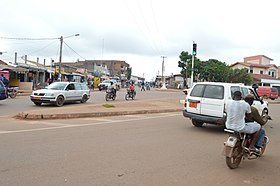User:Chiajelvis/Obili
| Obili | ||
 Vue du carrefour Obili | ||
| Administration | ||
|---|---|---|
| Country | ||
| Region | Centre | |
| Departement | Mfoundi | |
| Municipality | Yaoundé 3 | |
| Démographie | ||
| Population | 16 991 hab. (2005) | |
| Géographie | ||
| Coordonnées | 3° 51′ 26″ nord, 11° 29′ 33″ est | |
| Localisation | ||
Géolocalisation sur la carte : Centre Region
| ||
| modify | ||
Catégorie:Article utilisant une Infobox Catégorie:Article géolocalisé sur Terre
Obili is a neighborhood in the city of Yaoundé, the capital of Cameroon, located in the district of Yaoundé III.
History
[edit]In 1940, indigenous people living south of the city of Yaoundé were forced to leave the land they had occupied since 1912 by the French occupiers. They were forced to found another village. They settled on new land, "Obili". This word means "forced dwelling or residence". The toponym is an altered and apocopated form of the French word « Obligatoire »[1].
For a long time, "Obili" resisted the name "Onana Meubles", the name of a famous carpenter installed in this neighborhood. Another famous name in the neighborhood, "Biscuiterie", because of a factory of cookies of mark BR implanted between 1968-1969 in this place,.
Geography
[edit]Obili is located in the west of Yaoundé, surrounded by the districts of Ngoa-Ekelle, Biyem-Assi and Melen.
Education
[edit]Obili is a district with a strong educational connotation. In fact, the neighborhood is home to several schools, high schools and universities. Among the schools, there is for example Francky Nursery and Primary School. Similarly, the elementary school Sainte Thérèse, also of English expression. At the secondary level, there is also a private school of reference, English High School Yaoundé (EHS).

Obili is home to the Institute of International Relations of Cameroon (IRIC), a school of the University of Yaoundé II, specialized in diplomacy and international relations. It is also the headquarters of the National Association of Cameroonian Language Committees (ANACLAC) whose members are at the origin of the General Alphabet of Cameroonian Languages (AGLC).
Private educational institutions are also located in this area. Among others, the German language training center, JugendZentrum.
Institutions
[edit]It is in the Obili district that a branch of the Presidential Guard (GP) of Cameroon is installed.
The neighborhood is also home to the Missionary Sisters of the Resurrection orphanage, which has an English-language elementary school.
Economic activities
[edit]The economic activities are dynamic and varied in the Obili district. Among others, snack bars, take-away sales and general businesses.
As far as food is concerned, the neighborhood has two bakeries, including one of reference, the "French bakery". In addition, a fresh food market exists at the level of the chapel of Saint Anne of Obili.
Several travel agencies that serve cities in the West and Northwest regions are also based in the Obili district. This activity has developed other activities. Namely, the opening of snack bars nearby, as well as the trade of fresh vegetables and other foodstuffs from these regions. Similarly, the neighborhood is known for the sale of traditional fabrics and other accessories from the Northwest.
Obili is an area populated by students. As a result, several student housing units of private owners are built and inhabited by this population.
Places of worship
[edit]- The parish of Sainte Anne of Obili is for Catholic Christians. This parish has the particularity of offering services in several languages: English, French, and Ewondo (local language).
- Pentecostal churches..
Population
[edit]Cosmopolitan because of its history, Obili abounds in a population of varied origins. In addition to the indigenous population, there is a mix of people mainly from the Grassfields and other ethnic groups. In addition, there is a diverse student population, due to the higher education institutions (University of Yaoundé 1, Iric, Faculty of Medicine and Biomedical Sciences) that surround this neighborhood.
Health
[edit]For health needs, Obili has several private clinics. There are also two pharmacies.
Notes and references
[edit]- ^ "Obili en bref". www.camerlex.com (in French). 12 Février 2011.
{{cite web}}: Check date values in:|date=(help)
See also
[edit]Bibliography
- Jean-Marie Essono, Yaoundé une ville, une histoire, Yaoundé, Editions Asuzoa, 2016, 675 p. ISBN 978-9956-687-02-2, p.455
- Jean-Emmanuel Pondi, Redécouvrir Yaoundé ! Une fresque historique et diplomatique de la capitale camerounaise, Editions Afric’Eveil, 2013, 160P. ISBN 978 9956-7-4501-2,
External links
[[Category:WikiProject Cameroon articles]] [[Category:WikiProject Africa articles]] [[Category:Coordinates not on Wikidata]]

